Managing real estate operations manually can be time-consuming and error-prone. Missed lease renewals, untracked property statuses, and poor follow-up with prospective tenants often result in lost revenue and tenant dissatisfaction. Without the right tools, teams struggle to maintain consistency and visibility across projects.
In Singapore, the digital economy contributed 17.7% to GDP in 2023, yet many real estate businesses still rely on spreadsheets or disconnected platforms. This limits their ability to efficiently manage property portfolios, respond to client needs, and make data-driven decisions.
Property management software helps address these issues by automating workflows, improving asset tracking, and consolidating daily operations. This article reviews the top 10 property software solutions in 2025 to help Singaporean businesses simplify their property management.
Key Takeaways
|
What is Real Estate Software?
Real estate software is a set of tools designed to help professionals manage various aspects of their business, including CRM systems for leads, property management, and marketing. It also covers accounting, transaction management, and specialized solutions for tasks like closing processes and broker management.
Types of Real Estate Software
Real estate software comes in many forms, each designed to simplify and optimize different aspects of the industry. Here are the main types designed to meet specific needs:
1. CRM software
CRM software helps real estate professionals manage client relationships, track leads, and automate follow-ups. This software integrates client data, improves communication, and enhances sales performance. It is essential for building long-term relationships with clients.
2. Property management software
Property management software helps property owners and managers manage rent collection, maintenance requests, and communication with tenants. This tool simplifies daily property operations and ensures smooth management. It is crucial for efficient property and tenant oversight.
3. Marketing software
Marketing software helps agents promote listings and generate leads through email campaigns, social media, and online ads. This tool automates and tracks marketing efforts, increasing property visibility. This software increases brand awareness and leads generation.
4. Transaction closing software
Transaction closing software automates tasks related to property transaction completion, such as document preparation and contract management. This software ensures that the transaction closing process runs smoothly and efficiently. This tool is essential for expediting transactions and ensuring compliance.
5. Broker management software
Broker management software helps brokers oversee agents, track commissions, and manage operations. This software simplifies team management and optimizes office tasks. This software is vital for brokers to manage large teams and improve performance.
Benefits of Using Property Software

Property software helps simplify processes, improve communication, and increase productivity. Here are the main benefits of using these tools:
1. Increased efficiency
Automating tasks such as lead management, marketing, and transaction processing saves a significant amount of time. This allows agents to focus on the critical aspects of their work. This results in faster completion times and smoother workflows.
2. Better customer experience
Property software improves communication, offers personalized marketing, and provides faster service. This creates a better experience for clients, building trust and loyalty. Timely and effective responses contribute to higher client satisfaction.
3. Improved lead generation
With marketing automation and lead tracking, real estate software helps generate and manage leads more effectively. This ensures follow-ups are done on time, keeping leads engaged. This results in a more consistent flow of leads and better conversion rates.
4. Better business management
CRM software provides insights into sales performance and customer behavior. These insights help adjust strategies and make informed decisions. This leads to better management of overall sales and operational activities.
5. Cost savings
By automating routine tasks and streamlining processes, property software reduces operational costs. Less time spent on administrative work means more resources can be focused on other areas. This results in long-term savings and improved efficiency.
10 Real Estate Software Recommendations in Singapore (2025)
We’ve compiled a list of the top 10 real estate software in 2025 to help property businesses find suitable tools for daily operations. Each software has different features and limitations. You can choose based on your business needs and goals.
Explore our top recommendations to streamline property management, boost efficiency, and support better decision-making.
1. HashMicro
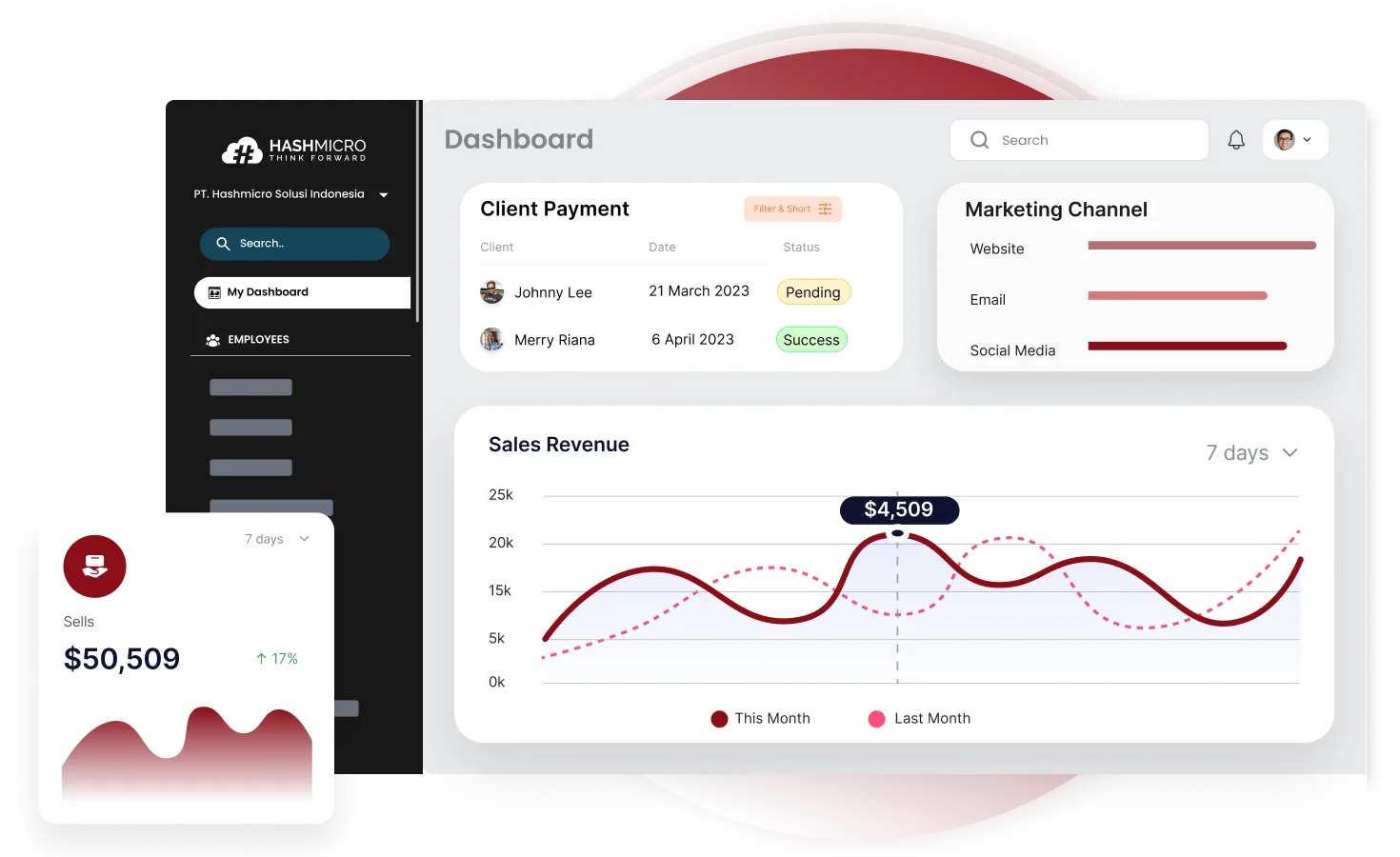
HashMicro Property Management Software is a cloud-based system designed to help property businesses streamline daily operations. It enables better control over unit availability, lease contracts, and sales tracking in a single integrated platform.
Tailored for real estate companies in Singapore and Southeast Asia, the software supports smarter property management with structured workflows and real-time access. The system simplifies how real estate professionals manage listings, monitor costs, and analyze performance.
Teams can organize property data, automate reminders for expiring leases, and improve coordination between agents and prospects. With its customizable modules, the platform supports end-to-end visibility across sales and operational activities.
Here are the key features of HashMicro’s Property Management Software:
- Property Management: This feature allows users to monitor the status of units in real time, whether they are still available, already rented, or undergoing maintenance.
- Contract Management: Makes it easy for businesses to store and access all lease contract documents, complete with important information. The system will send automatic reminders when the contract is nearing its expiration date, so that no processes are overlooked.
- Lead Management: Helps sales teams track performance, group the most promising prospects, and store the entire interaction history in one place. This speeds up the follow-up process and increases conversion opportunities.
- Agent Portal: Provides agents with access to record prospective tenant or buyer data, check unit availability, and create payment plan simulations tailored to client needs.
- Cost Management: This feature is helpful in tracking and monitoring daily operational costs, from building maintenance to marketing expenses. Businesses can compare budgets with actual expenditures to keep spending under control.
- In-Depth Reports: Provides customizable in-depth reports covering sales performance data, occupancy rates, agent activity, and financial analysis.
| Pros | Cons |
|
|
2. Contactually
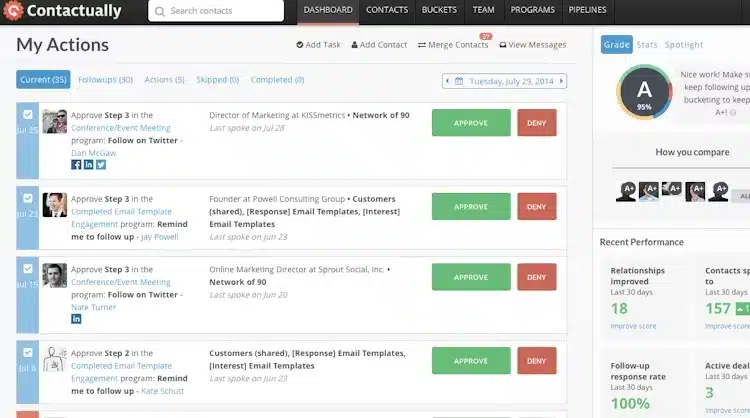
Contactually is a CRM software often used in the real estate industry to manage relationships with clients and prospects. It helps users organize contacts, schedule follow-ups, and maintain communication using email templates and reminders.
This software is typically used by agents who want to track conversations and stay consistent in their outreach.
Key Features:
- Contact categorization using “buckets”
- Automated follow-up reminders
- Email tracking and integration
| Pros | Cons |
|
|
3. Real Geeks
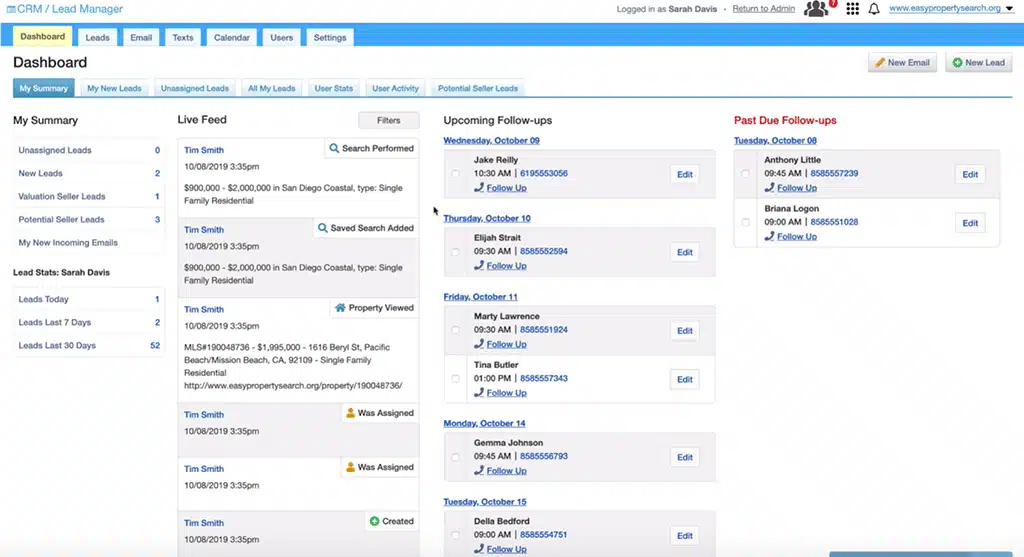
Real Geeks is a real estate software platform used by agents and small brokerages to manage leads and generate property websites. It includes tools for contact management, website integration, and simple marketing automation features.
The software is generally used by professionals who want a basic system to capture leads and stay in touch with potential clients.
Key Features:
- Lead capture and follow-up tools
- Website and IDX integration
- Email drip campaigns
| Pros | Cons |
|
|
4. AppFolio
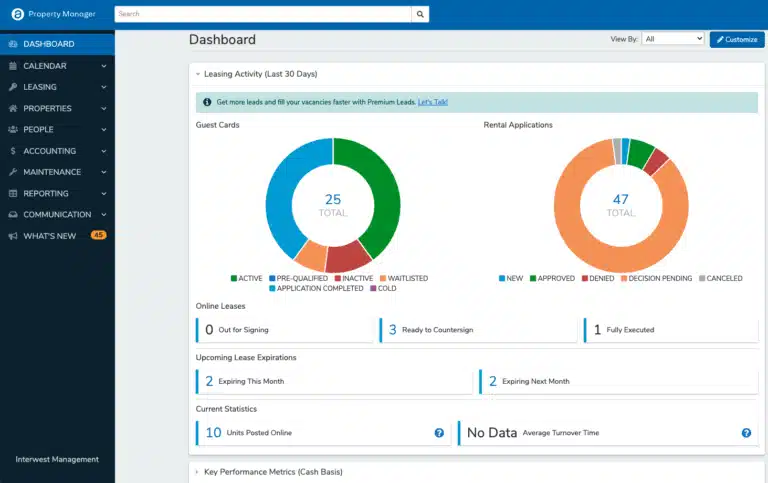
AppFolio is a cloud-based property management software used by real estate businesses to manage residential and commercial units. It includes tools for rent collection, maintenance tracking, and tenant communication in one platform.
The software is typically used by property managers who oversee multiple units and want to centralize daily operations.
Key Features:
- Online rent payment and tracking
- Maintenance request system
- Owner and tenant portals
| Pros | Cons |
|
|
5. BoldLeads
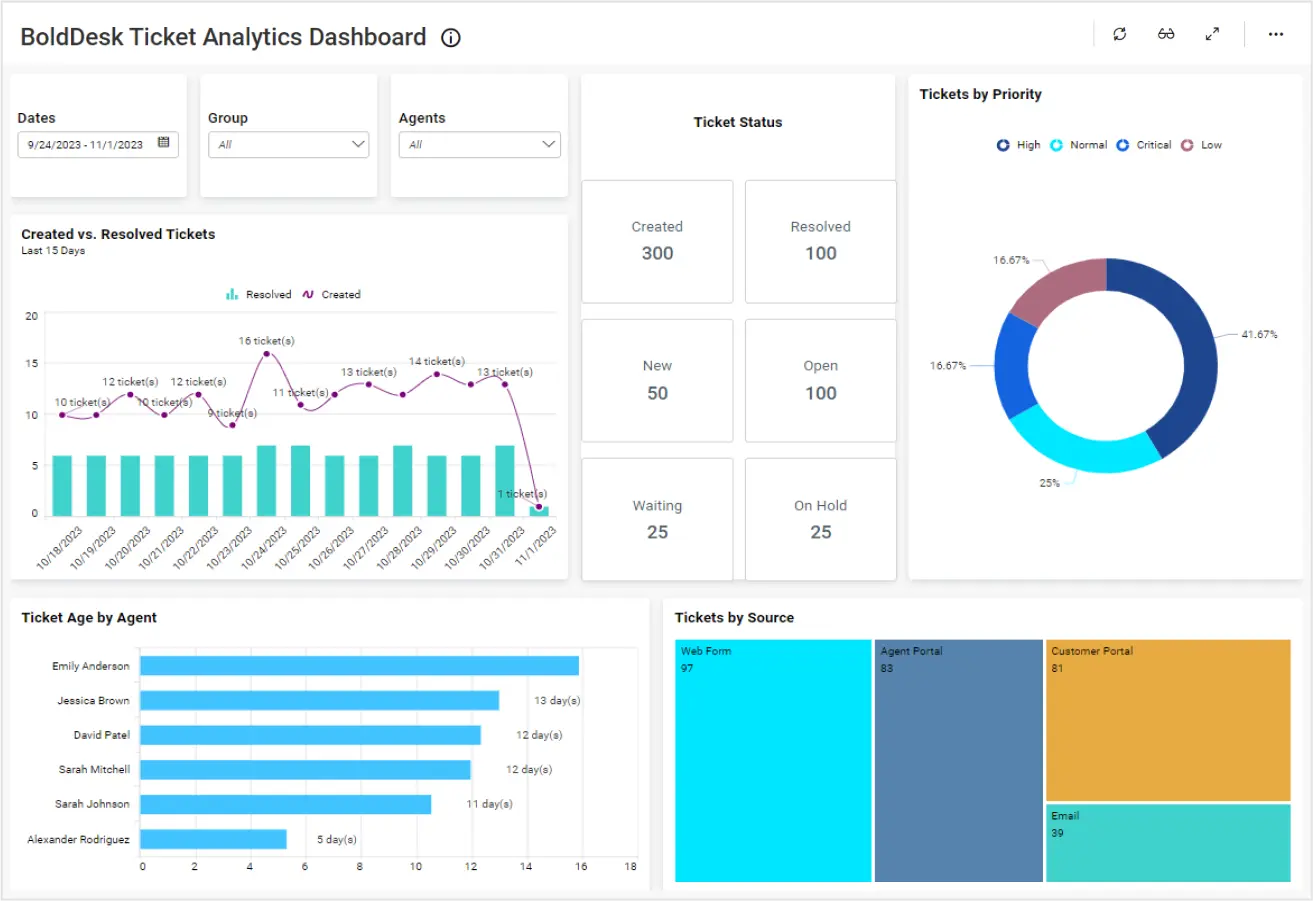
BoldLeads is a marketing tool used by real estate agents to generate leads through online ads and landing pages. It helps agents collect contact information from potential buyers or sellers and organize follow-ups in one place.
This software is mostly used by agents who prioritize client acquisition. It does not provide broader features for managing properties or transactions.
Key Features:
- Automated lead generation from ads
- Pre-built landing pages
- Drip email and SMS follow-up tools
| Pros | Cons |
|
|
6. Buildium
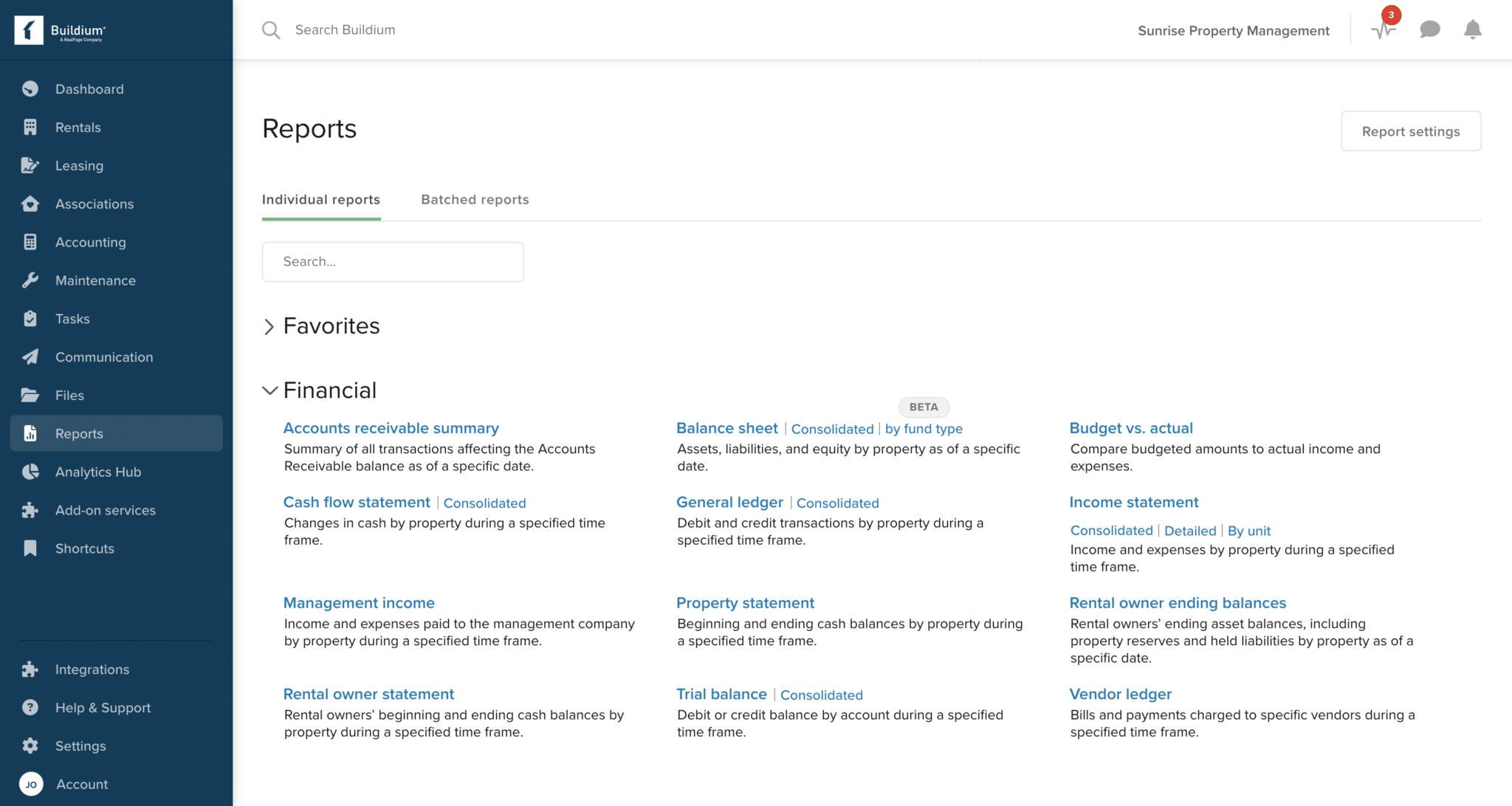
Buildium is software used to help manage properties online. It is commonly used by property owners or managers to record rent payments, store tenant data, and create basic financial reports.
This software is used by property businesses that need a system to record and manage daily operations without many additional features.
Key Features:
- Rent payment recording
- Contract and tenant data management
- Basic financial reports
| Pros | Cons |
|
|
7. kvCORE
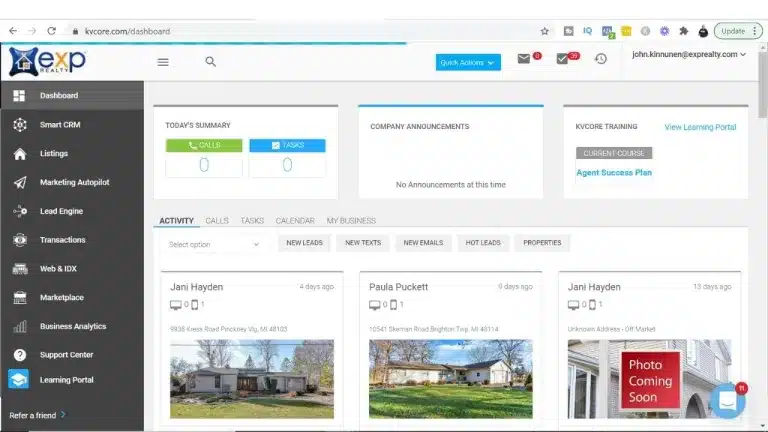
kvCORE is a real estate software platform used to manage leads, listings, and marketing tasks in one system. It includes tools for building websites, sending automated messages, and tracking client activity across channels.
The software is commonly used by property agencies or teams that want to handle marketing and client follow-up in one place.
Key Features:
- IDX website builder
- Automated email and text marketing
- Smart CRM for tracking lead behavior
| Pros | Cons |
|
|
8. Zurple
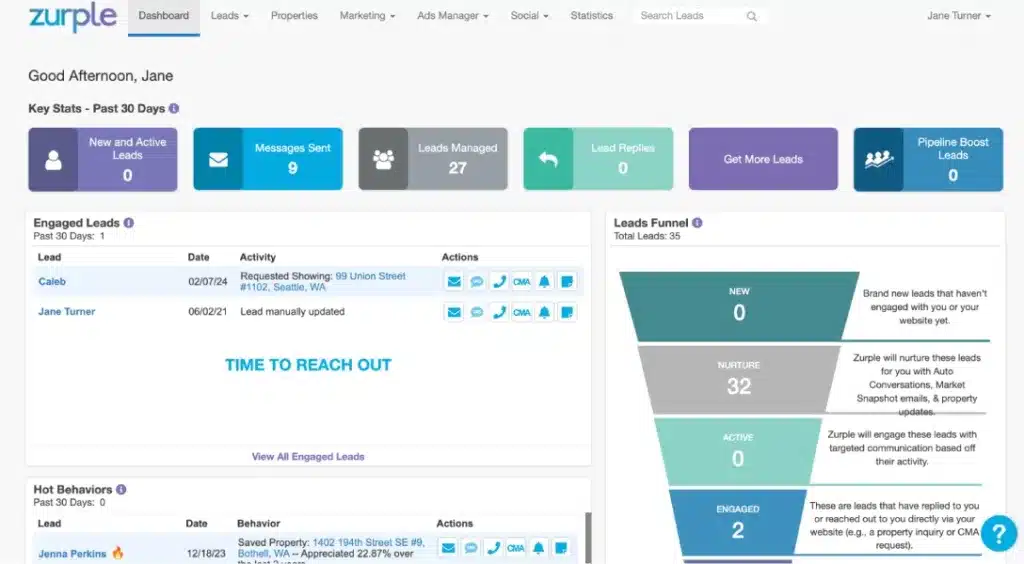
Zurple is a real estate software that focuses on helping agents manage online leads through automated conversations and behavior tracking. It works by analyzing visitor activity on property websites and sending follow-up emails based on their actions.
The software is typically used by agents who want to automate initial engagement with potential buyers or sellers.
Key Features:
- Lead behavior tracking
- Automated email follow-ups
- Contact management system
| Pros | Cons |
|
|
9. Zoho CRM
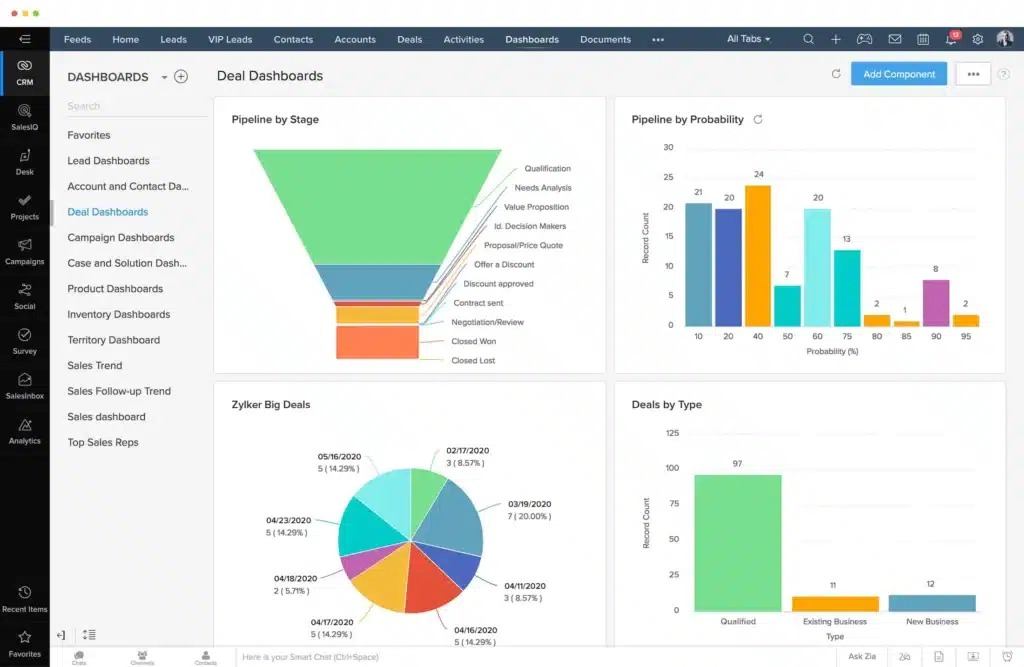
Zoho CRM is a customer relationship management tool that can be adapted for real estate businesses to organize contacts and automate follow-ups. It includes features for managing sales pipelines, sending emails, and tracking customer interactions.
The software is often used by property agents or small teams looking for a basic system to manage their leads.
Key Features:
- Contact and deal tracking
- Workflow automation
- Email integration and templates
| Pros | Cons |
|
|
10. Avochato
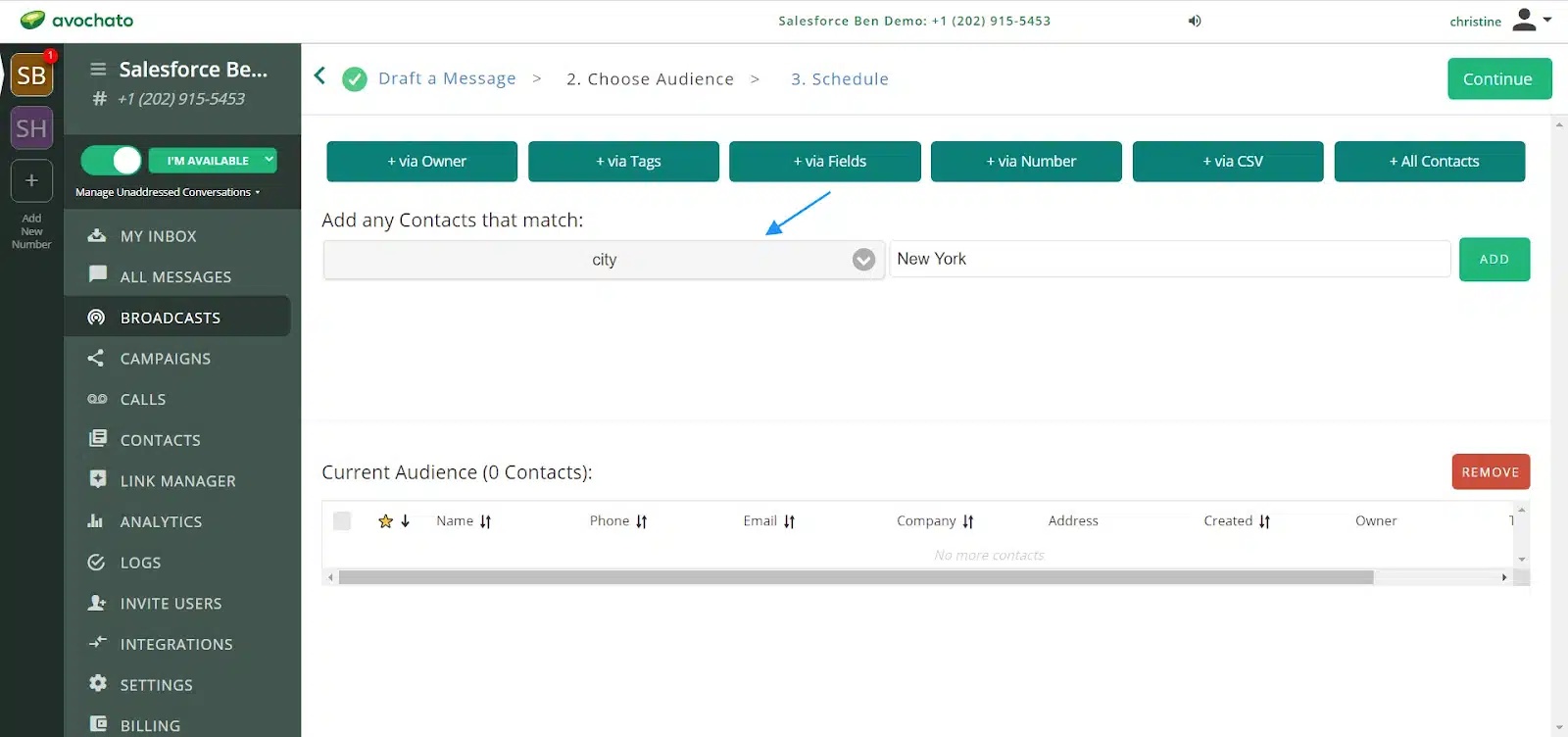
Avochato is a messaging platform used by real estate businesses to communicate with clients through SMS and live chat. It allows agents to manage conversations, follow up with leads, and schedule appointments from a shared dashboard.
This tool is commonly used by teams that prioritize fast, direct communication with potential buyers or renters.
Key Features:
- Two-way messaging system
- Shared team inbox
- Lead tagging and scheduling
| Pros | Cons |
|
|
Conclusion
Choosing the right real estate software helps improve property management, contract handling, and lead tracking. With so many options available, businesses must align their choices with their operational needs and system integration.
For companies seeking a scalable solution, HashMicro’s property management software offers contract automation, agent portals, and cost tracking in one system. It reduces manual work, improves unit visibility, and streamlines coordination between sales and leasing.
HashMicro’s solution is supported by the CTC Grant, allowing eligible businesses in Singapore to receive up to 70% funding support. This makes advanced real estate management tools more accessible for companies aiming to improve operational efficiency and client satisfaction.
Ready to digitize your property operations and boost performance? Schedule a free demo today and explore how HashMicro can help you manage properties smarter and close deals more efficiently.
Question About Real Estate Software
-
What is a real estate CRM software?
A real estate CRM (Customer Relationship Management) software helps property businesses manage leads, client interactions, and follow-ups in one platform. It streamlines communication, tracks deals, and improves sales efficiency
-
What is the most popular property management software?
HashMicro property management software is one of the most popular property management software solutions. It offers contract automation, agent portals, cost tracking, and real-time reporting to help property businesses manage units more effectively.
-
Do I need a CRM for real estate?
Yes. A CRM is essential for real estate businesses to manage leads, nurture relationships, and close deals faster. It helps reduce manual tasks and ensures better coordination across sales and leasing teams.
































